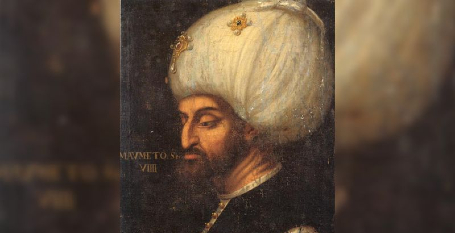Considered as one of the heroes of Turkish history, Mehmed the Conquerer consolidated and expanded the reach of the Ottoman Empire.
During his reign, he made many political and social reforms, encouraged the arts and sciences, and transformed Constantinople into a thriving imperial capital.
Early life
Born in 1432, Mehmed II was raised in Edirne, then the capital city of the Ottoman state. His father was Sultan Murad II, who ruled from 1404 until 1451.
When Mehmed II was eleven years old he was sent to Amasya to govern and gain experience as a leader. This was the normal custom for the training and development of Ottoman rulers of this period.
After Murad II made peace with the Karamanids in Anatolia in August 1444, he abdicated the throne to his 12-year-old son Mehmed II.
It was an unsettled time in the region, and Mehmed and his father Murad shared the throne for a number of years as Murad defended the Ottoman's territories against incursions from Hungary.
Reign
By 1451, Mehmed was firmly in control of the Ottoman Empire.
Mehmed's thirty-one year rule and numerous wars expanded the Ottoman Empire to include Constantinople, the Turkish kingdoms and territories of Asia Minor, Bosnia, the Kingdom of Serbia, and Albania.
Mehmed left behind an imposing reputation in both the Islamic and Christian worlds, with a focus on learning, respect for religion, and administration.
Personal life
During his life, Mehmed had fives wives and four children, but is widely understood to have been a gay man.
According to the contemporary Byzantine Chronicler, Laonikos Chalkokondyles, Mehmed took Radu cel Frumos, Prince of Wallachia, as a lover.
Joseph von Hammer-Purgstall, writing in the 19th century, has suggested that Mehmed also sexually pursued the younger son of megas doux Loukas Notaras, who had led the Byzantine navy in the defence of the city. This drew from the account of Leonard of Chios who wrote that Mehmed had sent a eunuch to the house of Notaras, demanding that he supply Jacob Notaras for the Sultan’s pleasure.
Mehmed died in 1481, aged 49. He fell ill while travelling on a military campaign.












 列印版本
列印版本




















讀者回應
請先登入再使用此功能。